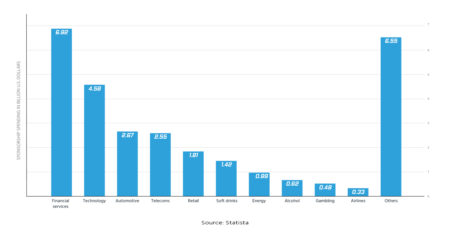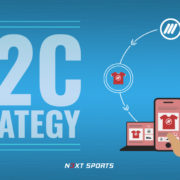EVOLUTION IN SPORTS SPONSORSHIP
Sports sponsorship is an important source of revenue for sports organizations. The global sponsorship market size will grow from $57 billion today to $90 billion by 2027 as per Statista. Traditionally, B2C companies flocked to sports sponsorship. Their objective was to reach maximum global awareness and capture new markets. This brought companies from telecommunications, airlines, financial services, and energy drinks, among others. According to Statista, the 2020 global sports sponsorship spending was led by the financial services sector with 6.92% of the total market share.

Now, we are seeing a shift in sports sponsorship with the entrance of B2B companies. In 2020, technology companies accounted for 4.58% of the global sports sponsorship spending. Companies like SAP, Oracle, Microsoft, or IBM, helped create a new integrative partnership approach. They came in to provide technological solutions such as marketing platforms, data platforms, content management systems and other customer-centric digital products and services. At the same time, they are using these solutions to gain market share, create content, and attract customers.

In 2014, Microsoft first signed a landmark deal with Real Madrid to accelerate its digital transformation process and provide a comprehensive and streamlined online experience to its supporters. According to Microsoft, the project involved the creation of a fan engagement platform, extended video platform on Azure services, consumer app to help analyze user behavior and provide a one on one fan experience. In 2019, Real Madrid reaped the benefits with revenue from digital up 30%, according to Sportbusiness. Other B2B giants like SAP have partnered with two of the biggest American leagues – NBA & NHL to improve the game by analyzing player and team data and bringing new insights on the field. These partnerships integrate sponsor’s products into sports organizations and create a closer association with the fans.
Following the trend of tech companies coming into the sports sponsorship landscape, nearly 40% of The Olympic Partner (TOP) sponsors are technology partners. Intel being one of the TOP sponsors increased visibility by showcasing their drone technology at the Olympic Winter Games PyeongChang 2018 which saw nearly 10 million engagements on their social media channels. Another TOP sponsor, Samsung has long been associated with the Olympics and they further extended their partnership to 2028. For instance, they distributed Samsung Olympic Edition Phones to 17,000 Olympic and Paralympic athletes competing to Tokyo 2020 as a way to promote their mobile first campaign featuring their advanced technology in an iconic blue body and the respective Olympic rings.
WHY DO TECH COMPANIES INVEST IN SPORTS?
1. Tech companies can easily showcase their capabilities to their target audiences by being part of the sports organization.
Sports sponsorships by B2B companies are more complex than other traditional deals. They are looking for deeper connections with their sponsored properties and influence the organization’s business model. At our 16th online meetup, Rick Welts, former president of the Golden State Warriors emphasized the need for a story behind a partnership and how brands can add value to the sports organization by showing what they do. In September 2019, Golden State Warriors opened the Chase Center, a privately financed $1.6 billion facility in San Francisco. Thanks to the new, and very sophisticated arena, and thanks to some of their technology sponsors, they were able to implement new technologies that helped them bring fans to the arena, and enhance the fan experience on site.
2. Tech companies provide the necessary tools for hyper-personalization.
With changing consumer habits and higher content consumption by fans, hyper-personalization is a must. However, tech companies have realized that some sports organizations are not advanced enough to implement their latest technology services and therefore they want to be part of their digital transformation process. In 2018, Salesforce, a cloud computing company partnered with the Indiana Pacers to enrich and personalize digital interactions with every Pacers fan. Salesforce provided personalized email marketing communications, social media engagement, digital advertising and customer services. In 2020, Pacers’ efforts to personalize outreach resulted in a 20% increase in email open rates as per Salesforce.
3. Tech companies can enhance data control and fan targeting through trend analysis.
Greenfly is an example of how an integrated partnership is helping organizations like PSG, German Football League (DFL), San Jose Sharks and many others. Greenfly is a SaaS platform that creates a central media exchange hub and private collaboration network to enable the collection, curation, organization and distribution of social media content data. Other sports organizations like the Texas Rangers use Tableau to streamline operations of ticket sales, concessions, merchandising, and even staffing costs. This business intelligence tool helps them to visualize ticket sale trends and understand what fans want, thus increasing revenues in real-time.
4. Tech companies can help sports organizations to unlock new revenue streams.
Sports organizations do not completely recognize and leverage the different digital assets they own. For example, many sports organizations run their own e-commerce websites and market products on different digital channels which takes a significant amount of effort from the marketing team. Working with tech companies allows sports organizations to recognize new assets, outsource the operations and use advanced tech available at a lower cost. Innovative companies like SQWAD enable organizations to build and launch sponsored digital contests that grow connections, drive leads, and send offers instantly to fans in stadiums or at home. For instance, SQWAD worked with Oklahoma City Dodgers and generated 1,500 total leads for SunTech, their heating & cooling partner with SQWAD’s Scratchers promoted over five nights.
WHAT'S N3XT
Tech companies will continue to invest and create new ways of leveraging sports brands. Esports is an industry of the future that cannot be ignored as it is completely powered by technology and predominantly attracts GenZ fans. With nearly $1 billion in revenue in 2020, most of the revenue (58 percent) was expected to come from sponsorships, which grew an estimated 17 percent compared with 2019 as per Mckinsey. Companies like Intel, AMD, HP, Logitech have already invested hugely in e-sports and implemented their advanced technologies to create new experiences for fans.
We have seen the rise of tech companies entering the sports industry with advanced products and creating a digital-first environment. To serve new sponsors, sports organizations need to be digitally prepared and have the right data and tech infrastructure in place. This starts with a complete digital transformation process which means understanding the current digital readiness of the organization and setting up the necessary data & digital infrastructure. It also means modernizing the workforce and instilling a digital culture in the organization. As we have seen throughout this article, the pandemic was proof that digitally savvy organizations will attract the top B2B sponsors and leverage their latest tech.
It is important to understand what sports organizations and tech companies can offer to each other and what they are looking for externally. Part of our work with our clients during the implementation phase of the digital transformation journey is to find the tools and the right tech provider to accelerate this process. Our team of sports & data experts can help you take the first steps and accompany you along the whole journey, from end to end.
Fill out the form below and our team will get in touch!



